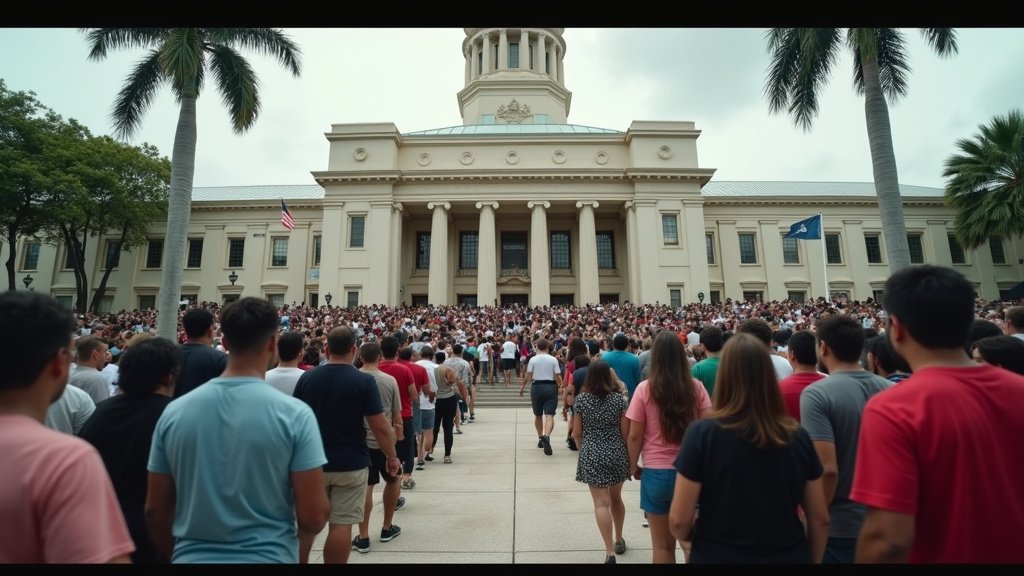MIAMI-DADE, FL – A pivotal legal battle commenced on Thursday, as hundreds of residents from Sweetwater’s Li’l Abner Mobile Home Park converged on a Miami-Dade courthouse to begin a mass trial. This significant proceeding marks a critical point in a months-long eviction effort that has cast a long shadow over one of the region’s most enduring communities, impacting a substantial number of mobile home owners across Miami-Dade.
For many of these residents, the courthouse on Thursday was more than just a venue for legal proceedings; it was a battleground for their homes, their livelihoods, and their sense of stability. The sheer volume of individuals involved in this singular case underscores the profound human element at the heart of the ongoing housing crisis in South Florida, a pressing issue dominating current affairs in the metropolitan Miami area.
A Community Under Siege
Li’l Abner Mobile Home Park, nestled within the city of Sweetwater, has long served as an anchor of affordable housing in a rapidly gentrifying Miami-Dade County. For decades, it has provided a haven for families, retirees, and individuals who, despite owning their mobile homes, lease the land beneath them. This unique arrangement places them in a particularly vulnerable position when landowners decide to pursue redevelopment or other changes.
The genesis of Thursday’s mass trial lies in a months-long eviction effort initiated by the park’s ownership. Details of the effort, which has unfolded over an extended period, have been a constant source of anxiety and uncertainty for the community. Residents have reported receiving notices, engaging in initial legal consultations, and grappling with the prospect of displacement. This drawn-out process has created a climate of apprehension, transforming what was once a quiet residential area into a focal point of a significant legal dispute.
The collective appearance of hundreds of residents on Thursday to contest this months-long eviction effort is a testament to their unified resolve. It highlights not only their individual plight but also the collective strength and determination of a community fighting for its continued existence.
The Unfolding of a Mass Trial
Thursday’s proceedings marked the official commencement of what has been described as a mass trial. This legal strategy, where multiple similar cases or claims are consolidated and tried together, is often employed in situations involving a large number of plaintiffs or defendants against a common entity or action. In this instance, it allows the court to hear arguments from hundreds of mobile home owners simultaneously, all of whom are contesting the same overarching eviction effort.
The scene inside and outside the courtroom was one of quiet intensity. Residents, some of whom have lived in Li’l Abner for decades, arrived with legal representatives, community advocates, and family members, forming a visual representation of the scale of the impending judicial undertaking. The logistical challenge of accommodating and processing such a large group of litigants for a single trial is itself a significant undertaking for the Miami-Dade court system, signaling the gravity and complexity of the case.
The mass trial structure, while potentially streamlining the legal process, also places immense pressure on all parties involved. For the residents, it represents their singular best chance to present a united front against the eviction notices and to argue for their right to remain in their homes. For the park’s ownership, it’s an opportunity to press forward with their plans, while for the judiciary, it’s a test of its capacity to handle a high-stakes, high-volume dispute with fairness and efficiency.
Broader Implications for Miami-Dade Housing
Beyond the immediate impact on the residents of Li’l Abner Mobile Home Park in Sweetwater, this case reverberates far more broadly. It directly impacts a significant number of mobile home owners throughout Miami-Dade County, serving as a stark reminder of the precarious nature of this form of affordable housing.
In a metropolitan area like Miami, where housing costs continue to soar, mobile home parks have traditionally offered a vital, accessible alternative to conventional homeownership or rental markets. However, as land values increase, many such parks face pressure from developers or landowners seeking to repurpose these valuable parcels. This situation frequently pits long-term residents against powerful commercial interests, creating poignant housing news and economic tension.
Observers of urban development and housing policy are closely watching the developments in this trial. The outcome could potentially set a precedent or influence future legal strategies for similar disputes involving mobile home parks and their residents across Florida. It highlights the urgent need for robust protections for those who own their homes but lease their land, a demographic often overlooked in broader housing policy discussions. This case underscores the ongoing challenges in Miami’s housing sector, which remains a primary focus in current affairs discussions.
The Road Ahead
As the mass trial continues to unfold in Miami-Dade, the residents of Li’l Abner Mobile Home Park remain in a state of anxious anticipation. Their future, and the future of affordable housing options for a significant segment of the population, hangs in the balance. The commencement of this trial on Thursday marks not an end, but a critical new chapter in their fight.
The proceedings are expected to be lengthy, with complex legal arguments and detailed testimonies anticipated. The entire community, along with housing advocates and concerned citizens, will be closely monitoring the developments, understanding that the judgment rendered in this courtroom could have far-reaching implications for the stability of mobile home communities throughout Miami-Dade and beyond. The struggle for these hundreds of residents is more than just a local dispute; it is a powerful symbol of the broader fight for housing security in an ever-evolving urban landscape.





